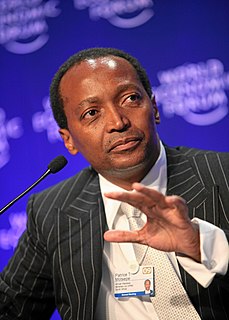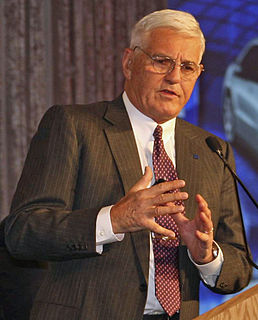A Quote by Thabo Mbeki
If you look for instance at the automobile industry, part of the reason that you have the expansion of that sector, is precisely because we have gone out to talk to the automobile companies to explain government policy with regard to that sector, to talk to them about the MIDP and things like that. And indeed, it has been a very important part of attracting those investors to put in money in the South African economy and build motorcars in South Africa.
Quote Topics
About
Africa
African
Automobile
Automobile Industry
Because
Been
Build
Companies
Economy
Expansion
Explain
Gone
Government
Government Policy
Important
Important Part
Indeed
Industry
Instance
Investors
Like
Look
Money
Out
Part
Policy
Precisely
Put
Reason
Regard
Sector
South
South Africa
Talk
Them
Things
Those
Very
Related Quotes
When I was in government, the South African economy was growing at 4.5% - 5%. But then came the global financial crisis of 2008/2009, and so the global economy shrunk. That hit South Africa very hard, because then the export markets shrunk, and that includes China, which has become one of the main trade partners with South Africa. Also, the slowdown in the Chinese economy affected South Africa. The result was that during that whole period, South Africa lost something like a million jobs because of external factors.
I think anybody who knows anything about South Africa and the South African economy would know that one of the big constraints to growth and development is skills shortages. So all of us, need to come at this thing as vigorously as is possible and, of course, the private sector has the capacity to take it on board.
I spent my whole life in the private sector, 25 years in the private sector. I understand that when government takes more money out of the hands of people, it makes it more difficult for them to buy things. If they can't buy things, the economy doesn't grow. If the economy doesn't grow, we don't put Americans to work.
The export of oil, the export of minerals, will for many decades continue to be a critical part for the growth of African economies. The emphasis is on diversification. We have for many years - not just in South Africa but in many parts of the continent - spoken about beneficiation. And I think part of the secret, in relation to beneficiation, is you have got to make it attractive, profitable for the private sector - and it will take off. You may have to look at mechanisms like tax concessions... You will not have to worry about beneficiation if it makes commercial sense.
That's one of the biggest losses, I think, to African American families, is that people, once they left, they turned away from the South. They didn't look back, and they often didn't tell their children about it. They didn't want to talk about it. It was too painful, what they'd gone through and the caste system of the South, which was Jim Crow.
I don't really understand Darren Lehmann coming out and saying the South African crowd has been out of order. Any England player, even media, who have toured Australia can laugh at those comments because some of the things we hear on the pitch from Australian supporters, known as 'banter,' I know is worse than in South Africa.
It is considered in England and the United States that the Government of South Africa is altogether too harsh with its native peoples. It is sadly humorous to notice that the native in South Africa, however, holds an exactly reverse opinion and the fault he finds with the South African Government is that it is far too lenient in its administration of laws throughout the native populace.







































